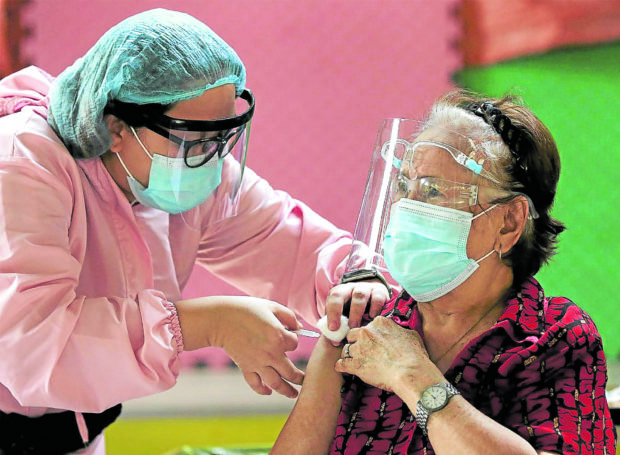DOH, DOST level broad accusations vs media over COVID vax ‘disinformation’

BE NOT AFRAID An elderly woman in Pasay City shows there is nothing to fear as she gets her
shot of the AstraZeneca COVID-19 vaccine at Timoteo Paez Elementary School. —RICHARD A. REYES
MANILA, Philippines — The Department of Health (DOH) and the Department of Science and Technology (DOST) have called out “media institutions” for supposedly misinforming the public on COVID-19 vaccines and insinuating that the government has a preferred vial of choice.
However, the two agencies did not name which media organizations published content or material that claims such biases and wrong information.
“[DOH] and the [DOST] on Friday called out media institutions continuing to publish disinformation on COVID-19 vaccines and said that misleading information on COVID-19 vaccines does more harm than good to Filipinos,” the statement posted over DOH’s Viber group with reporters said.
“Contrary to insinuations that the Vaccine Expert Panel (VEP) is only promoting one brand of vaccines, the DOH and the DOST said that the panel is guided by science in evaluating vaccines. Moreover, the VEP is objective in evaluating the safety and effectiveness of COVID-19 vaccines being used in the country,” it added.
In the joint statement, DOH Undersecretary Maria Rosario Vergeire said that the spreading of rumors and unfounded claims would not help increase the public’s trust in vaccines.
“In times of crisis, clear and effective communication can spell the difference between life and death. We have seen how crucial clear and effective communication is and it is for this very reason that we continue to expand our capacities to communicate always in pursuit of equipping Filipinos with the right knowledge to protect not only themselves but their loved ones as well,” she said.
“We appeal primarily to our media partners to exercise caution when reporting potentially misleading information about COVID-19 vaccines. Vaccines are safe and vaccines are effective and we all know this. Let us work together to help Filipinos better understand the benefits of vaccines. In times of crisis, vaccines can spell the difference between life and death,” she explained.
Members of the media sought clarification on Vergeire’s statements, asking that DOH mention what are the particular stories aired or published that they were referring to so that the media organization involved can correct this and make amends.
Reporters also asked for more details on the supposed misinformation incident, because it appears as a sweeping and generalized observation which leaves the public second-guessing to what reports are not verified and legitimate.
In response, Vergeire said that this was a general reminder to the media industry about ensuring accuracy in reporting about delicate health matters related to COVID-19, especially on vaccines.
“In the context of the apparent need to boost vaccine confidence, we issued this as a general reminder to all our media partners to ensure that all our efforts are aligned, working toward our shared goal of hurdling this pandemic quickly, and effectively,” Vergeire said in a follow-up message.
However, Vergeire still did not name the media organization and the report they were pertaining to, although she assured reporters that they have reached out to the media outfits concerned.
“We have already reached out to certain outfits regarding our concerns, and we will continue to work with them to resolve these,” she noted.
“We appreciate all of you who continue to help us communicate science in the proper context to the general public. Let us continue to stay true to our sacred mission of providing the public correct and actionable information which they can use to protect themselves and their loved ones,” she added.
While the country’s COVID-19 vaccination rollout is currently ongoing, there have been numerous surveys that pinpoint low vaccine confidence among Filipinos.
A survey conducted by analytics group OCTA Research last January showed that only 25 percent of respondents in Metro Manila — the COVID-19 pandemic’s epicenter in the Philippines — are willing to take vaccine shots even if they are available.
Nationwide, OCTA Research said that 46 percent of Filipinos or almost half do not want to have themselves vaccinated.
Meanwhile, the most recent Pulse Asia survey on COVID-19 vaccines released last March 26 revealed that 61 percent of Filipinos say no to the vials, with safety concerns cited as the top concern.
Despite the low vaccine confidence among Filipinos, observers including health experts and opposition officials have never blamed it on the media.
Previous statements by Vice President Leni Robredo have stressed the need for the government to create an effective COVID-19 roadmap, to combat misinformation on social media and other fraudulent sites.














